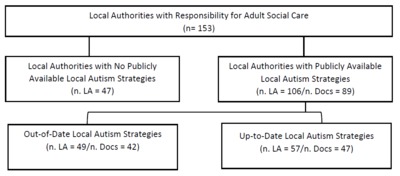Jay, Bethany 


|
Published Version
Available under License Creative Commons Attribution. Download (598kB) | Preview |
|
|
Supplemental Material
Available under License Creative Commons Attribution. Download (206kB) | Preview |
|
|
Supplemental Material
Available under License Creative Commons Attribution. Download (354kB) | Preview |
|
![[img]](https://e-space.mmu.ac.uk/635353/4.hassmallThumbnailVersion/Figure%201%20%283%29.png)
|
Supplemental Material
Available under License Creative Commons Attribution. Download (42kB) | Preview |
Abstract
Background Intimate relationships are an important, yet ordinary, part of many people’s lives. However, autistic people experience greater challenges around sex and intimate relationships and more loneliness and isolation. As diagnostic rates for autism in the UK increase, international research shows that support around sexuality and gender diversity is imperative to promote autistic people’s well-being. Health and social care policies should guide social care systems to address inequalities that autistic people face. However, our recent policy analysis shows that national health and social care policies in England tend to overlook support for intimate relationships. Building upon this research, this study investigates if and how local autism strategies in England recognise and prioritise support for sex and relationships. Methods This empirical study employs a novel five-step process for critical policy analysis designed to identify and evidence both presences and absences within documents. We systematically identified all publicly available local autism strategies in England (89 documents). We combined keyword searches and hybrid thematic analysis (both deductive and inductive) to scrutinise the policy content. To evidence absences in the representation of intimate lives within these documents, we supplemented this with content analysis, using code quantification to support final themes. Results The findings evidence a clear lack of positive and proportionate representations of intimate lives across local strategies. No strategy contained a priority area focused on supporting intimate relationships, and most strategies did not consider people’s intimate lives within relevant priority areas like transition to adulthood and housing, or in relation to support for LGBTQ+ autistic people. The study highlights the importance of advocating for the recognition of autistic people’s intimate lives in national autism policy. Conclusion We present six recommendations for integrating recognition and support for sex and relationships into future autism strategies and policymaking processes, with clear significance to international autism policy contexts.
Impact and Reach
Statistics
Additional statistics for this dataset are available via IRStats2.



